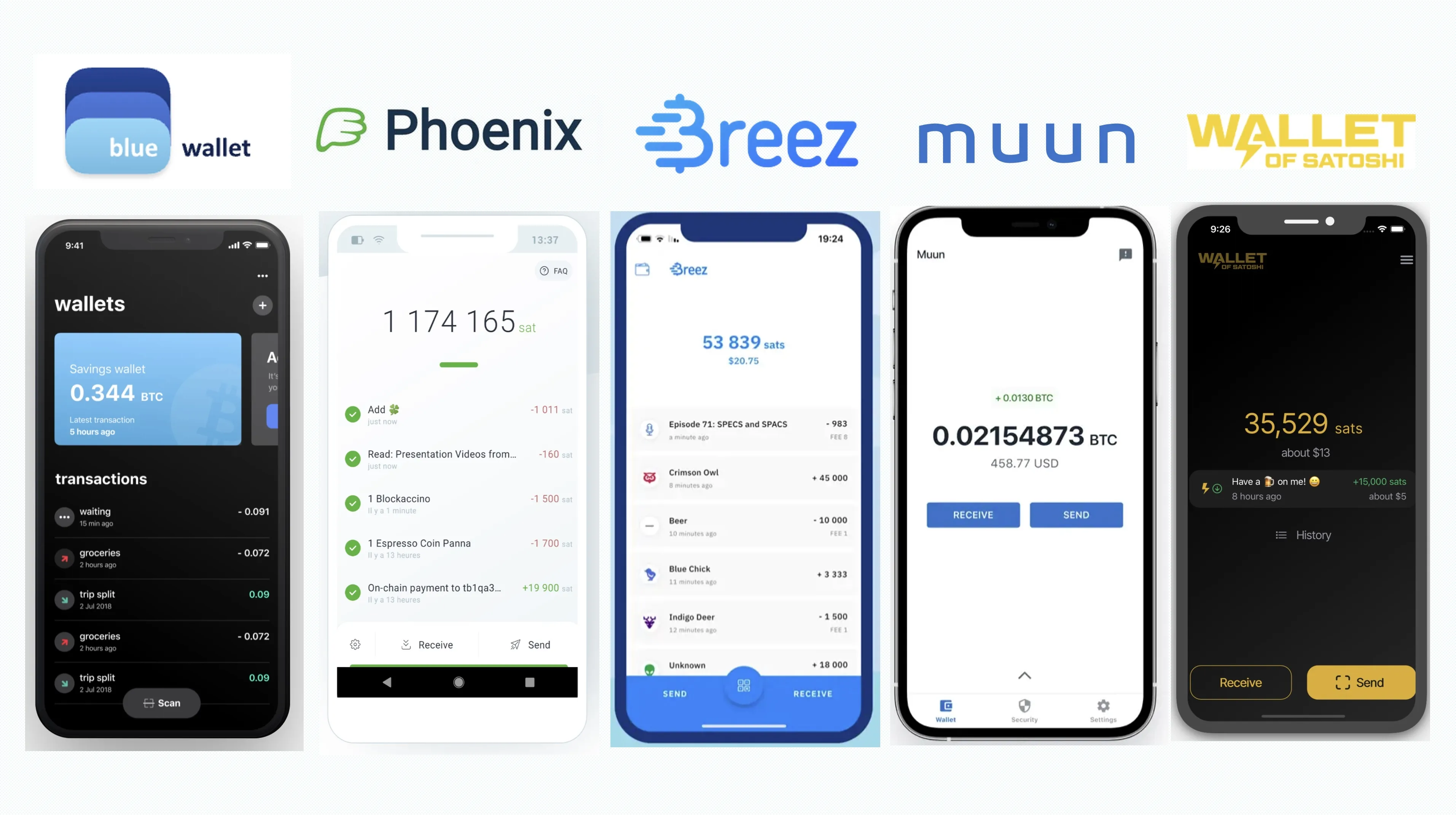
Lightning Network wallets have become a hot topic in the cryptocurrency field. Below are the top five Lightning Network wallets ranked, along with the benefits of using Lightning Network wallets, the advantages of MixPay, and considerations to keep in mind when using Lightning Network wallets.
Top Five Lightning Network Wallets:
- BlueWallet: A mobile non-custodial wallet that supports multiple cryptocurrencies, including Bitcoin and Lightning Network payments. BlueWallet offers custom transaction fees, multi-language support, and a fast transaction experience. It also provides various security measures such as Touch ID, Face ID, PIN code protection, and BIP39 mnemonic backup.
- Phoenix Wallet: A wallet designed specifically for Lightning Network payments. It offers fast and convenient Lightning Network payment features and a user-friendly interface. Phoenix Wallet also supports security measures such as BIP39 mnemonic backup and PIN code protection, and provides the ability to make and request payments quickly.
- Breez Wallet: A mobile non-custodial wallet that supports Bitcoin and Lightning Network payments. Breez Wallet provides custom transaction fees, automatic channel management, and fast Lightning Network payment features. It also offers various security measures such as BIP39 mnemonic backup and PIN code protection, as well as additional features such as support for Apple Watch and Google Assistant.
- Muun Wallet: A secure Lightning Network wallet that provides multiple security measures such as BIP39 mnemonic backup and multi-signature. Muun Wallet offers fast and convenient Lightning Network payments and multi-language support.
- Wallet of Satoshi: A mobile non-custodial wallet that provides fast and convenient Lightning Network payment features and a user-friendly interface. It also offers security measures such as PIN code protection and BIP39 mnemonic backup. It supports Bitcoin and Lightning Network transactions, and provides the ability to make and request payments quickly.
Benefits of Lightning Network Wallets
- Faster transaction speed: Compared to traditional blockchain transactions, Lightning Network transactions are faster and almost instantaneous, without waiting for blockchain confirmations.
- Lower transaction costs: Transaction costs on Lightning Network are usually lower than traditional blockchain transactions, as transactions take place within payment channels and do not require miner fees.
- Higher scalability: By using payment channels, the number of transactions on the blockchain can be reduced, thus improving the blockchain's throughput and scalability.
- Better privacy: Transactions on Lightning Network are peer-to-peer, and do not need to be broadcast to the entire network, thus transactions have higher privacy.
- More use cases: Lightning Network can be used for Bitcoin and other blockchain transactions, for online and offline payments, and for traditional and micro payments.
Advantages of MixPay
MixPay supports all of the above Lightning Network wallet payments, including BlueWallet, Phoenix, Wallet of Satoshi, and more. MixPay is a decentralized Web3 cross-chain payment protocol that supports multiple cryptocurrency assets and Lightning Network payments. Merchants can use Lightning Network on their website or application via MixPay's API, without worrying about compatibility issues between different wallets. This makes it more convenient for users to use Lightning Network for fast, convenient, and low-cost payments, saving merchants development costs and providing users with a better payment experience.
Considerations when using Lightning Network Wallets
- Choose a trusted wallet: Make sure the selected wallet is developed and maintained by trusted developers with a good reputation and a wide user base.
- Protect your wallet's private keys: Lightning Network wallets require users to save their private keys for transactions, and leaked private keys can lead to fund theft. Therefore, private keys should be kept in a secure place, such as an offline hardware wallet or cold storage device.
- Do not store too much funds in Lightning Network wallets: Although Lightning Network wallets provide faster and lower-cost transactions, it is still an emerging technology and carries risks. Therefore, do not store too much funds in Lightning Network wallets, only store an appropriate amount of funds for regular transactions.
- Pay attention to transaction confirmation: Lightning Network transactions do not require confirmation on the blockchain. However, if the transaction is abnormal or the channel is not closed properly, it may result in transaction failure or fund loss. Therefore, it is recommended to monitor the status of transactions, ensure successful transactions, and close payment channels in a timely manner.
- Upgrade wallet version in a timely manner: Since Lightning Network is still evolving and improving, upgrading the wallet version is very important. Updated versions often include bug fixes and performance improvements, so timely upgrading can enhance wallet security and reliability.
In summary, Lightning Network wallets have important implications for the popularization and application of cryptocurrency and blockchain technology, with faster transaction speed, lower transaction costs, higher scalability, better privacy, and more use cases. Using MixPay makes it more convenient to use Lightning Network for cross-chain payments. However, it is important to choose a trusted wallet, protect private keys, not store too much funds in the wallet, pay attention to transaction confirmation, and upgrade wallet version in a timely manner to ensure safe and reliable transactions.
About MixPay Protocol
MixPay Protocol is a decentralized web3 payment protocol, which connects different chains, different tokens, different wallets, and exchanges, whether it is an on-chain wallet (MetaMask, Trust Wallet) or a centralized wallet (Blockchain.com, BlockFi), or exchanges (Binance, Coinbase). As long as they access the MixPay Protocol, they can provide their users with safe, simple, and free payment services anywhere in the world marked by MixPay, without merchants needing to care about what wallet or token the customer uses to pay, just like what Visa and Mastercard do in the traditional payment field.